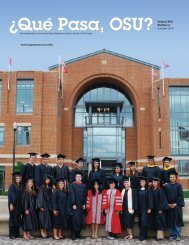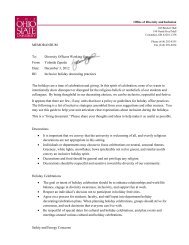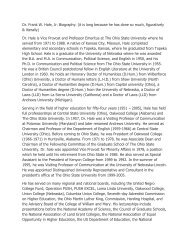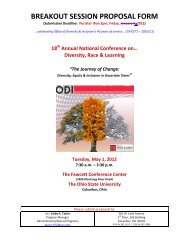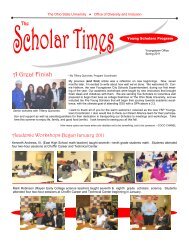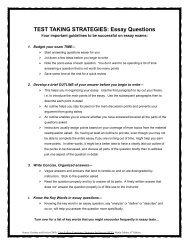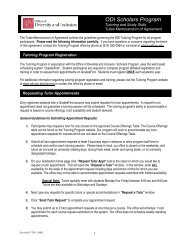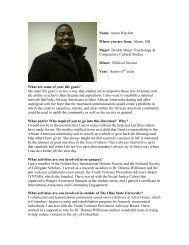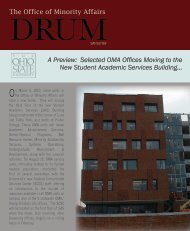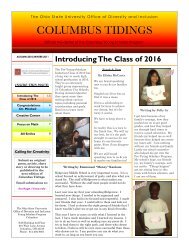Idea LabSupporting Diverse Creative Development at <strong>OSU</strong>By Ben Delgado, MA Student, Arts Policy and Administration and Idea Lab Coordina<strong>to</strong>r, Urban Arts SpaceArt has always been a part of my life.As a child I made works with crayons,markers, clay, and pencils. My interestsdeveloped as I grew in<strong>to</strong> more complexmedia such as painting, ceramics, crocheting,and ultimately film. It was my passionfor film that led me on the winding path<strong>to</strong> The Ohio State University. As a master’sstudent, I am fortunate <strong>to</strong> be able <strong>to</strong> workfor the <strong>OSU</strong> Urban Arts Space, an offcampusgallery and alternative performingarts space in down<strong>to</strong>wn Columbus,where I am the Idea Lab Coordina<strong>to</strong>r.Idea Lab supports Ohio State Universitystudents in their creative, entrepreneurial,and sustainable activities through projectsupport, workshops, men<strong>to</strong>ring, andrelationship building. We seek projectsthat engage the community throughthe arts, innovation, and financial andenvironmental sustainability with lastingimpact on the Columbus community.Idea Lab is an amazing opportunity.Every Ohio State student may apply <strong>to</strong>receive hands-on assistance and guidanceas well as program support for projectsand ideas. We hold workshops, facilitatecommunity connections, providefunding, and extend our support <strong>to</strong> helpmove projects along in all stages. IdeaLab is organized each year by the IdeaLab Coordina<strong>to</strong>r (who is also an annualBarnett Fellow, designated <strong>to</strong> the Spaceby the Department of Arts Administration,Education, and Policy) with the assistanceof several Urban Arts Space staff who help<strong>to</strong> promote the call for entries and supportrelated events. With essentially a one-personstaff that rotates annually, getting theword out is no easy task. At times, it seemsan uphill battle <strong>to</strong> give away money.While as a Mexican-American I findit easy <strong>to</strong> immediately extend my sympathiesand camaraderie <strong>to</strong> the greaterLatino community, it is all <strong>to</strong>o easy <strong>to</strong>develop blinders <strong>to</strong> the concerns ofother communities. Fixated on my ownfamiliar struggle, I can forget <strong>to</strong> lookbeyond my backyard <strong>to</strong> see others in differentcommunities struggling with thesame issues. For example, the 2013 IdeaLab has awarded funding <strong>to</strong> a projectentitled Dumarka Soomaaliyeed VoicesUnveiled. It is an interactive, virtual, pho<strong>to</strong>exhibition space exploring the way thatyoung Somali women experience andunderstand their role within their communityhere in Columbus. Currently theproject is <strong>to</strong>uring through the Columbuspublic libraries. The <strong>go</strong>al is <strong>to</strong> extend theproject in<strong>to</strong> the virtual realm in order <strong>to</strong>make it participa<strong>to</strong>ry and reach a wideraudience for new exhibitions and worksdocumenting the lives of Somali womenin the Columbus area and throughout thecountry. This is just one example of howIdea Lab can help the promotion of diversityand give voice <strong>to</strong> a cultural minority.His<strong>to</strong>rically, the Latino community inthe United States has lacked significantrepresentation both in the art world andas members of the collegiate class. IdeaLab provides an opportunity for widerrecognition of Latinos through projectproposals from students of all culturalbackgrounds for projects that focus ondiversity and community development.Idea Lab not only facilitates the expressionof creative ideas, but also providesa platform for students <strong>to</strong> demonstratetheir passions beyond the classroom, thusextending that work past the boundariesof campus.This sort of idea was never on my radargrowing up. With parents who came <strong>to</strong>the country as teenagers who had <strong>to</strong> worktheir way up <strong>to</strong> living on $20 a week withtwo kids, it’s a wonder there was time, letalone money, <strong>to</strong> provide my sister and mewith artistic opportunities. Art and creativityare essential <strong>to</strong> the developmen<strong>to</strong>f a culturally literate individual. Withcultural literacy comes cultural and socialcapital that manifest in<strong>to</strong> greater accomplishments.The development of this kindof literacy can begin at an early age, butfor parents who have <strong>to</strong> cope with thebasic challenges of language acculturationand putting food on the table, sucha Bourdieuvian ideal is the last thing ontheir minds. This is where Idea Lab canhelp.Idea Lab offers a push forward <strong>to</strong>students with innovative ideas. AsCoordina<strong>to</strong>r, I am proud <strong>to</strong> be one of thestudents afforded the opportunity <strong>to</strong>contribute <strong>to</strong> my community in a meaningfulway. It is important that we work<strong>to</strong> improve our representation throughactions as well as words. Idea Lab is aperfect vehicle for Latino <strong>OSU</strong> students <strong>to</strong>take on that task.<strong>OSU</strong> Urban Arts Space is located at 50 W.Town Street in the his<strong>to</strong>ric Lazarus Building.2013 Idea Lab projects will appear throughoutthe spring and summer at various locationsin the community. Applications forthe 2014 Idea Lab cycle will be availableautumn, 2013. For more information visituas.osu.edu/idealab or call 614-292-8861.10
Summer, Sutures, and South AmericaA Brazilian Surgical Oncology InternshipBy Alexandra Dulin, Junior, Center for Life Sciences EducationThe patient had been prepared, thenurse and surgical technologist waitedpatiently, and I was scrubbed in andlooking <strong>to</strong> the resident standing on theoppo<strong>site</strong> side of the bed. He noddedencouragingly and I <strong>to</strong>ok a deep breath.I gripped the scalpel and made the firstincision on the right superior shoulder ofthe patient.Students on the pre-medicine trackwith hopes of specializing in surgeryalways dream about their first time operatin<strong>go</strong>n their own. While the little detailsmay differ from one student <strong>to</strong> the next,all fantasize the moment one firmlystates: “Scalpel.” But this was no fantasy.At twenty years old, in the most southernstate of Brazil, I performed surgery. Underthe supervision of a resident, I removedmalignant melanoma from a man’sshoulder and stitched up the four-inchincision. While it may not have been themost glamorous moment, I became asurgeon with the first cut.What sounds like a fantasy was myreality for six weeks. During the summerof 2012, I lived out my dream of being asurgeon. I was treated like an intern andwas able <strong>to</strong> participate in every consultation,exam, and surgery. Even withoutany medical experience on my part,the doc<strong>to</strong>rs <strong>to</strong>ok the time <strong>to</strong> teach medifferent skills and held me <strong>to</strong> certainstandards. From my first day, I was inthe operating room scrubbing in. I wastaught how <strong>to</strong> place sutures, do skingrafts, intubate patients, insert catheters,and countless other procedures. I washeld responsible for rounds and checkingvitals of my attending’s patients. I learnedmore than I could have imagined.Outside of the operating room, Ilearned what only experience couldteach me. Interacting with patients ona personal level helped me understandthat what made the surgeons I wassurrounded by truly superb was theirdemeanor and their kindness. Theirextensive knowledge of the medicine,diagnosis, and treatment was impressive,but it was the way that they interactedeach and every day with their patientsthat set them apart. The relationshipsthat the surgeons had with their patientsmade fighting cancer seem that mucheasier, but had a difficult side-effect:saying <strong>go</strong>odbye. Having such personalconnections made it so that when aperson died from the terrible disease, themedical staff didn’t just lose a patient, butalso a friend.While these relationships are what setapart the medical staff from any I haveinteracted with before, it was impossiblydifficult watching the pain they feltwhen patients died. When working withoncology patients, dealing with death ispart of the job. Before working in Brazil,I believed that the best way <strong>to</strong> handle somany emotions was <strong>to</strong> become immune <strong>to</strong>them and thus become robotic and unattached.However, after spending so muchtime with the patients and staff, I realizedthat it was impossible <strong>to</strong> do so. Indeed, itwas the worst thing I could do as a medicalprofessional. Attitude and outlook areeverything in medicine, andshutting those emotionsout doesn’t make onestaff member better thananother. Instead, it restrictshow large an impact theyare able <strong>to</strong> make on apatient and their familymembers.The most valuablelesson I learned wasn’t aprocedure or a skill, butinstead something I couldnever learn in a classroom.Spending all day in an operatingroom and activelyparticipating made mereevaluate whether or notsurgery was something <strong>to</strong>which I wanted <strong>to</strong> dedicatemy entire life. Now, surgicaloncology is the only careerI can imagine. I am confidentthat when I graduatefrom medical school andam placed in my own operatingroom, I will be able<strong>to</strong> handle it well. I haveevery confidence that I amdestined <strong>to</strong> be a surgeon.It is the only thing that I want <strong>to</strong> do withmy life.Further, this confidence has transcendedmy desires <strong>to</strong> <strong>go</strong> <strong>to</strong> medical school. It hasgiven me much more motivation in everyaspect of my life. I am able <strong>to</strong> slow downand enjoy each of my classes instead offeeling anxious and unsure. Most importantly,I have become more stringentlymotivated <strong>to</strong> do well in all that must comebefore. The decision <strong>to</strong> seek an internshipand <strong>go</strong> somewhere unexpected haschanged my life for the better.In 2012, Alexandra Dulin worked in HospitalSanta Rita in Por<strong>to</strong> Alegre, Brazil for sixweeks. She was under the tutelage of Dr.Felice Riccardi, surgical oncologist.www.quepasa.osu.edu Spring Semester 2013 11




